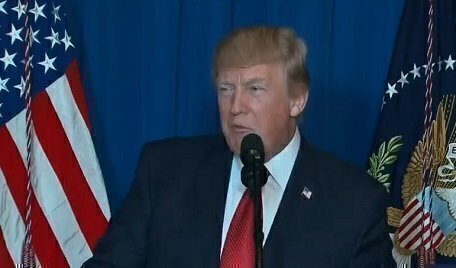A civil rights group told the Supreme Court on Monday about President Trump’s online relay of anti-Muslim videos circulated by a British organization. In a letter, the American Civil Liberties Union argued that the “retweeting” of those images supports claims of the President’s purpose in imposing new immigration restrictions on foreign nationals from Muslim-majority nations.
 The letter also gave the Court later information on the status of entry visas sought by some of the ACLU’s clients in the case, noting that some have been received but others remain pending in government agencies.
The letter also gave the Court later information on the status of entry visas sought by some of the ACLU’s clients in the case, noting that some have been received but others remain pending in government agencies.
At this point, the Justices are only studying the question of whether to allow the Trump Administration to put into full effect immediately the third, and latest, version of official restrictions on entry of people from six nations where Muslims have population majorities. Those have been blocked by federal judges in Maryland and Hawaii. The ACLU is involved in the Maryland case.
It is not unusual for lawyers to provide a court with updated information in a pending case, even after all of the regular filings have been submitted. That is usually done by sending a letter to the Court, as the ACLU has just done. The Administration would be free, if it wishes, to file a response to that letter. Otherwise, all filings are in, so the Justices could act at any time on the enforcement question. The Justices are not formally required to take such letters into account when they act on a case, but usually will do so.
Saying that there are “changed circumstances,” the ACLU first provided the new information about the status of visa applications by their clients. Then, as a second point, it referred by titles to each of the three videos that the President has posted last week on his Twitter account.
Each of the videos purports to show a violent or deeply disrespectful act by a person of the Muslim faith. At least one of the videos, circulated by “Britain First,” has been described as fake. The British government and others in Europe have criticized the President for further spreading the videos via Twitter.
In its letter, the ACLU cited a news story saying that the White House had defended these tweets while mentioning the presidential Executive Order on immigration restrictions, which that story called a “travel ban.”
The letter said the postings of those videos remain on the President’s Twitter pages, “and are relevant to the question of purpose” behind the presidential order.
Trump Administration lawyers have energetically argued that the latest presidential order is completely neutral on religion, and was crafted by a number of federal officials who could not be accused of acting out of anti-Muslim bias. The challengers to all versions of the presidential order have argued that each was designed to discriminate against Muslim foreign nationals on the basis of their religion.
The ACLU also commented in the letter that it was sending similar updated information to a lower appeals court that is scheduled to hold a hearing on the immigration restrictions next week.
Legendary journalist Lyle Denniston has written for us as a contributor since June 2011 and has covered the Supreme Court since 1958. His work also appears on lyldenlawnews.com.






